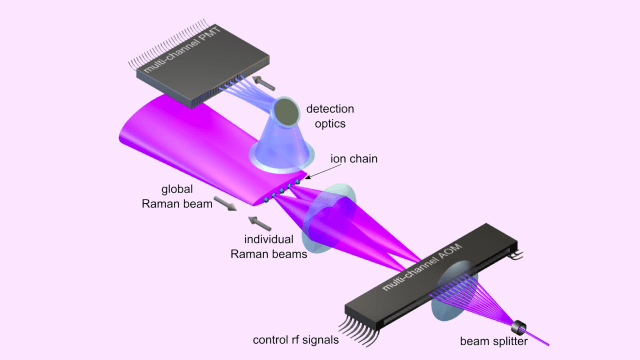Quantum computers could immeasurably speed up the rate at which calculations run — but so far, their promise has yet to be realised. Now, a team of researchers has built a versatile quantum chip that it reckons could be pieced together to create a powerful computational device.
Quantum computers can, theoretically, be so much faster because they take advantage of a quirk in quantum mechanics. While classical computers use bits in 0 or 1, quantum computers use “qubits” that can exist in 0, 1 or a superposition of the two. In turn, that allows it to work through possible solutions more quickly.
But while quantum devices with two or three qubits have existed for some time, it’s proved hard to the scale the technology up to create devices with enough qubits to provide a meaningful jump in computational speed. There is, of course, the D-Wave quantum computer, which claims to handle hundreds of qubits — but the jury is still very much out on whether or not the computer actually takes advantage of true quantum effects.
Now, as Technology Review reports, a team from University of Maryland in College Park has announced that they have created a versatile new five-qubit quantum computer module. But more excitingly they also reckon it will actually scale, allowing them to string a series of the units together to create a genuinely powerful quantum computer.
The new device uses five ytterbium ions which are trapped in a row using strong electromagnetic fields. By firing laser pulses at the ions the researchers are able to tweak their electrical state, in turn encoding quantum information upon them. Now, because the atoms are all charged, they also exert a force on each other. By carefully tweaking the electromagnetic fields holding the ions in place, the team can vary the contribution these forces create, allowing them to also dictate how the quantum information the ions hold interacts across the device.
In other words, they can use the trapped ions to perform quantum logic operations — and quantum code is little more than a complex combination of these kinds of logical operations. In a paper published on the arXiv server, the team explains that the device can already be used to implement a variety of different quantum algorithms. That’s better than most quantum computers, which to date tend to be limited to crunching though very specific tasks.
The team claim that is should be possible to string up a series of the chips to create a larger, modular quantum computer. Predictably, though, they’re yet to actually achieve that — and while it might sound straightforward, there’s plenty that could go wrong.We’ll have to wait and see if they can do it.
[arXiv via Technology Review]
